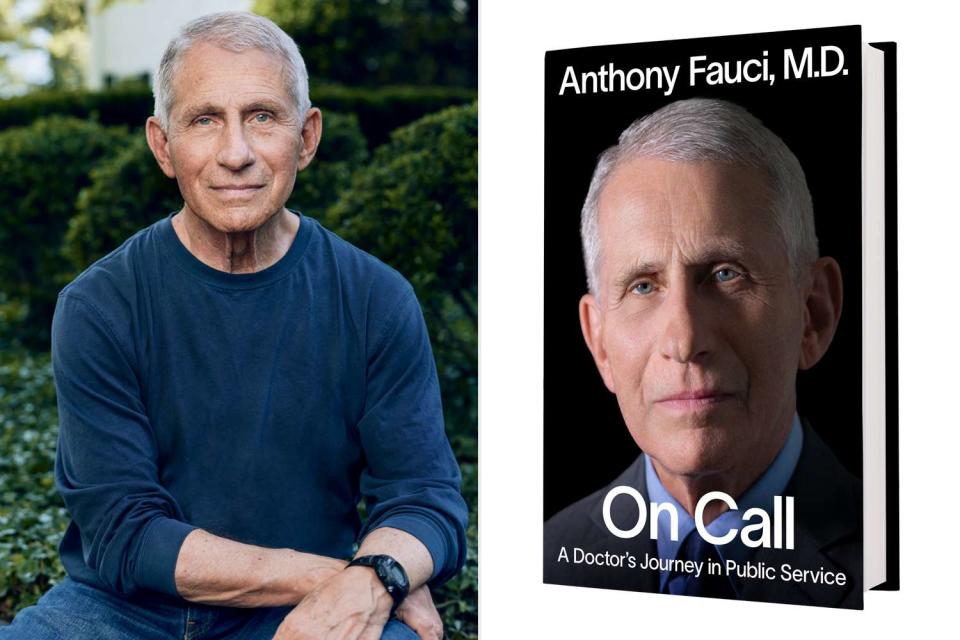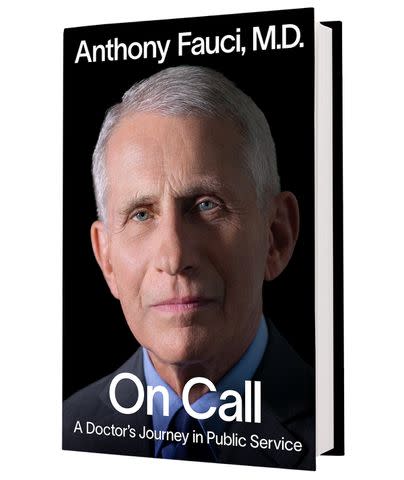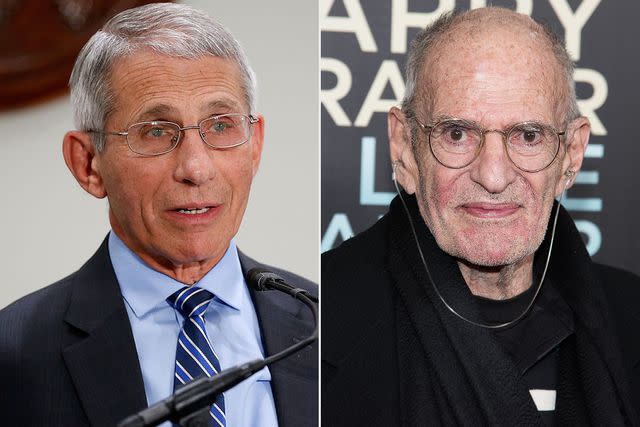How Dr. Fauci Made Peace with Fierce Critics — AIDS Activists — and Befriended a Former ‘Nemesis’ (Exclusive)
ACT UP founder Larry Kramer once called him a murderer and "an incompetent idiot"

Jesse Dittmar/Redux
Dr. Fauci and his new book 'On Call'Dr. Anthony Fauci has fielded criticism throughout his career, but some of his fiercest adversaries later became his closest pals. One of those was the late Larry Kramer, the fiery founder of the activist organization AIDS Coalition to Unleash Power, better known as ACT UP.
Fauci became director of the National Institute of Allergy and Infectious Diseases in 1984, at the same time that the AIDS epidemic was raging. By the time then-President Ronald Reagan first used the word "AIDS" in a press conference on Sept. 17, 1985, there were already 15,000 reported cases of AIDS in the United States and more than 8,000 deaths due to HIV.
Fauci recounts his journey with AIDS research in his new memoir On Call: A Doctor’s Journey in Public Service. The gay male community, which was far and away the hardest hit by the epidemic, were vocally outraged that the federal government was not moving quickly enough in developing effective treatments for the disease.

“I felt that it was my responsibility not only to conduct and support biomedical research on AIDS but also to speak out in whatever venue possible about the seriousness of this pandemic, its devastating potential and the need to do more,” Fauci writes. But even then, he wasn’t naive about the target that put on his back.
In late 1986, Fauci met with Kramer and some of his fellow activists and had what he called a “calm discussion about our plans to ratchet up the AIDS research effort.”
“It was critical to interact with the activists, and the best way to do this was to get to know their leader,” Fauci writes.
Never miss a story — sign up for PEOPLE's free daily newsletter to stay up-to-date on the best of what PEOPLE has to offer , from celebrity news to compelling human interest stories.
In June 1988, Kramer wrote a San Francisco Examiner article titled “I Call You Murderers, an Open Letter to an Incompetent Idiot, Dr. Anthony Fauci.” In it, Kramer criticized Fauci for not working fast enough to fight AIDS. But even though Fauci was hurt by being called a “murderer,” Kramer’s anger made sense to him.
“I was saying to myself, ‘I would be doing exactly what they were doing if I were in their shoes,’” Fauci tells PEOPLE. “One of the best things I've ever done in my life was to say, ‘Let me put aside the theatrics, the confronted behavior and the iconoclastic behavior, and listen to what they were saying. And once I listened to what they were saying, everything got better. Better for medicine, better for science, better for regulation.”
Fauci met with activists when they protested at the National Institutes of Health in February 1989 to demand better drugs than AZT, which was the only treatment available at the time. And on June 23 of that year, he spoke at a town hall meeting in downtown San Francisco. There, he “gave an impassioned speech saying that I was now totally convinced we should embrace a parallel track approach to testing certain drugs for HIV/AIDS and its complications,” Fauci writes.
That speech angered the FDA because it contradicted their official position at the time, but it revolutionized the country’s — and the world’s — approach to the AIDS epidemic. Soon after, Kramer attended an open government hearing on the subject and shouted from the back of the room, “Tony, I have called you a murderer in the past, but you are now my hero.”
Kramer and Fauci kept in touch over the years, eventually becoming friends. “During a private dinner for just the two of us in his apartment, we reminisced like two aging warriors who recalled the battles we had fought together, how despite our initial adversarial relationship, we ultimately became partners in an important struggle, and how differences of opinion, and even a history of antagonism, are entirely compatible with friendship,” Fauci writes, in his book.

Shortly before Kramer died in May 2020, he and Fauci spoke on the phone for one last time: “It ended with Larry’s saying, ‘I love you, Tony.’ I tearfully responded, ‘I love you, too, Larry,’” Fauci says.
He reflects on his friendship with Kramer when asked about the harassment — and death threats — he now receives related to his handling of the COVID-19 pandemic. “There's such a difference between saying, ‘You know, Fauci, you're a murderer, because you're being strict. If you would only listen to us, things would be better,' rather than, ‘Fauci. I want to kill you — and they really do want to kill you,’” he says.
Fauci's wife, Dr. Christine Grady, says she was affected by the animosity toward her husband: “Back then, I didn't like when people criticized Tony because of things that he was or wasn't doing, because I knew how hard he was working and how much he cared about what he was doing, and I knew that he was trying to do the right thing in almost every case."
Related: Dr. Anthony Fauci's Esteemed Career in Photos
“I still don't like the criticism,” she adds. “But the difference in those days was, ‘Well, you're critical of them. Can't you just spend a minute and understand them?’ [Now] I'm afraid for him, and I'm afraid for all of us. There's no listening, there's no trying to make things better. It's just hate. It's vitriol. It's awful.”
But for his part, Fauci is optimistic that, just like the ACT UP activists came around, the "better angels" of today’s critics will win out.
“If people start to really realize that we're much more the same than we are different, we will get away from what Chris was describing as that vitriol and that hatred because that's untenable,” he says. “And even if you are in that camp of being vitriolic, deep down, you gotta realize that that's not a solution. It's just not.”
On Call: A Doctor’s Journey in Public Service is available now, wherever books are sold.
For more People news, make sure to sign up for our newsletter!
Read the original article on People.


